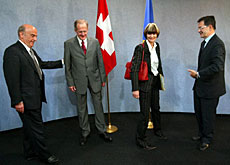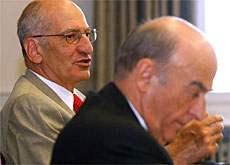Party leader promises Radical reform

Leadership crises, factional infighting, dwindling support and ballot box losses are just a few of the issues the Radical Party has been facing over the past year.
Its new president, Rolf Schweiger, told swissinfo the party has to rethink its social policy and make up lost ground.
The Centre-right Radicals are Switzerland’s oldest political party and have been part of the government since 1848.
For a long time, they were also the biggest parliamentary group, but have since lost ground to the Social Democrats and, more recently, the rightwing Swiss People’s Party.
swissinfo: A week ago, voters massively rejected three proposals to reform pension plans and taxation. It was a defeat for the government and parliament. What went wrong?
Rolf Schweiger: I have the feeling that there is not only a gulf between the government and parliament, but also between parliament and the people.
Voters don’t trust their politicians as much as they have done in the past. They voted “no” to be on the safe side.
swissinfo: Why do people no longer trust politicians?
R. S.: The population has begun to feel the effects of some [of the country’s] problems. But politicians haven’t had the courage to stand up and tell people about the real situation.
In my opinion, many people want to be clearly told what issues we are facing. They are not looking for solutions, but they want to know what the future holds for us in different areas.
swissinfo: Slashing government spending is one of the Radical mantras. One of your cabinet ministers, Pascal Couchepin, oversees social security and wants to raise the retirement age to 67. Do you think many people are prepared to accept this?
R.S.: It’s unfair to just talk about raising the retirement age. We need a whole series of measures to get the state pension scheme back on its feet.
People are still used to living a comfortable life, but they have to realise that the social security system needs to be overhauled.
In Germany, they thought they could ignore the situation altogether. I don’t want the Swiss to face the same problem.
swissinfo: You say there is a lack of desire to proceed with reforms. Where should we start with reforms?
R.S.: I believe we will have to draw a line in the sand. We will have to support those who really need it, while those who don’t require assistance will have to make some sacrifices.
swissinfo: Over the past few years, Switzerland has had virtually no economic growth. What do you suggest can be done?
R.S.: Competition must play a bigger role. The domestic economy suffers from structural problems, the effects of too many rules and regulations as well as outdated ways of thinking.
Amazingly, our export industry is much better structured and has no problem competing on the global market. But the domestic economy ignores this success.
We also need to deregulate massively. Companies don’t have enough breathing space.
swissinfo: Aren’t you afraid some of your voters won’t want to hear this and will give up on the party?
R.S.: I realise this, but I warned from the start that it would be my role as party president to say things that aren’t nice to hear right now, but have to be said if we consider the future of our country.
I believe citizens are prepared to deal with unpleasant decisions to ensure a better future.
swissinfo: Politicians seem to have an increasing tendency to serve up simple solutions to complex problems. How do you plan to get your message across?
R.S.: It’s impossible for the Radical Party alone to have all the solutions to all the problems. I would like to bring all the parties together and analyse the situation. When a party only considers its share of the electorate, reforms don’t stand a chance.
swissinfo: With your “Avenir Radical” (Radical Future) project, you want to show yourselves as a forward-looking party. But party members on the Right say you are just taking Social Democrat ideas on board.
R.S.: People who think that have no idea how I want to position the party. On government spending and taxation, we are definitely to the Right of the political spectrum.
But there are other issues where I’m thoroughly modern – and I hope the party will be too – on issues such as the role of women and the younger generation. Unfortunately, there are people who think giving women a bigger place in society is a leftwing notion.
swissinfo: Switzerland and the EU have wrapped up negotiations on a new round of bilateral accords with the European Union. Will this suffice for the coming years, or will Switzerland have to re-evaluate its relationship with the EU?
R.S.: That’s a difficult question for any Swiss. I am pro-European, but I’m against joining the EU.
I have no problem with the EU if it doesn’t impinge on our sovereignty and if it’s prepared to work with us.
But if Brussels is not prepared to accept us as we are, then we should re-consider whether joining the EU is an option for us.
swissinfo: Are you against joining the EU for practical reasons or because of issues relating to Swiss democracy?
R.S.: Of course, emotional, state and political considerations play a role [in the EU question]. But there are also economic reasons, such as keeping the Swiss franc.
The EU is becoming more inflexible and more bureaucratic. [But] it’s true today that in Switzerland we are even less flexible and just as bureaucratic.
But we have the opportunity to buck that trend. If we want to, we can become more flexible, become an example in the global economy, and then we could be more successful in new markets in Asia and the United States.
swissinfo-interview: Andreas Keiser (translation: Scott Capper)
Rolf Schweiger took over as president of the Radical Party last month.
The 59-year-old senator from canton Zug is considered a hardliner on public spending, but is considered more liberal on social issues.
He was elected on a promise to reform his party and recover its share of the electorate.

In compliance with the JTI standards
More: SWI swissinfo.ch certified by the Journalism Trust Initiative



You can find an overview of ongoing debates with our journalists here. Please join us!
If you want to start a conversation about a topic raised in this article or want to report factual errors, email us at english@swissinfo.ch.